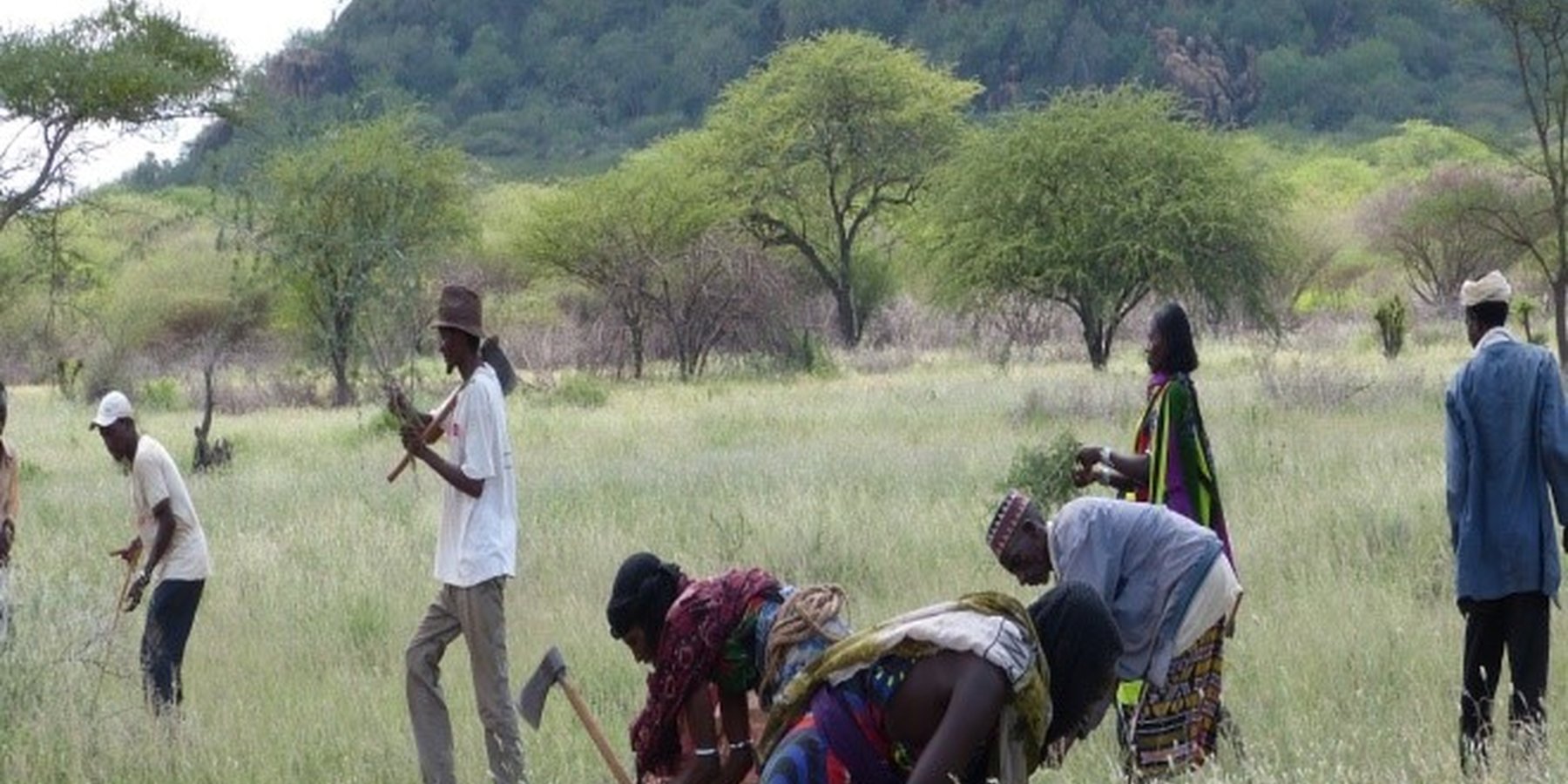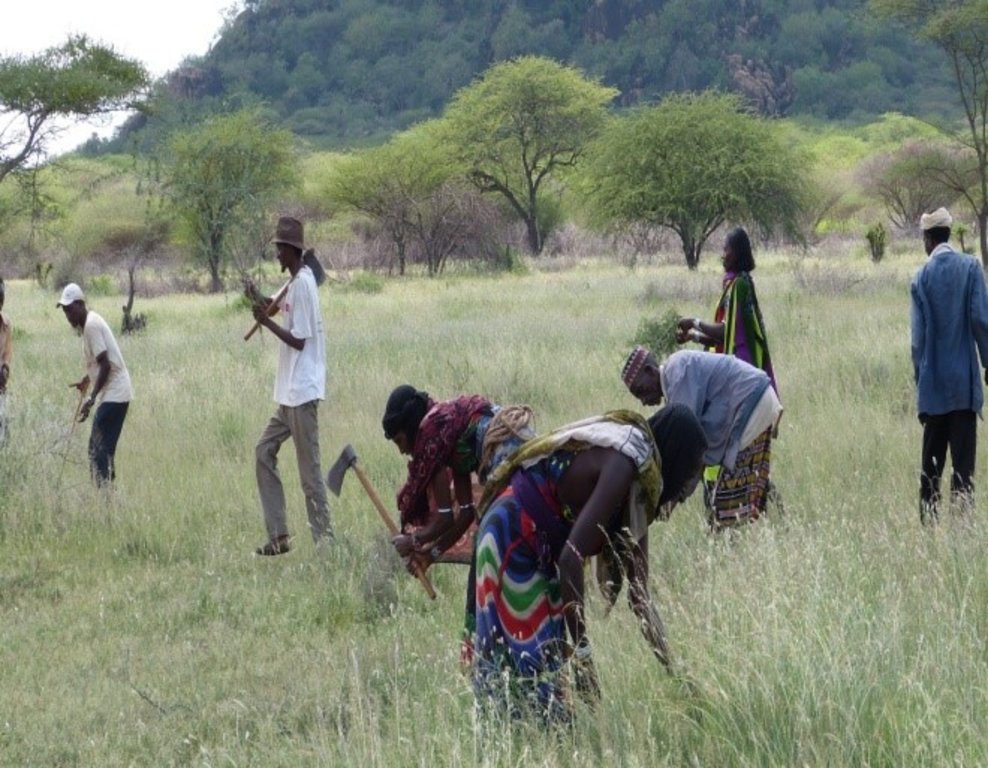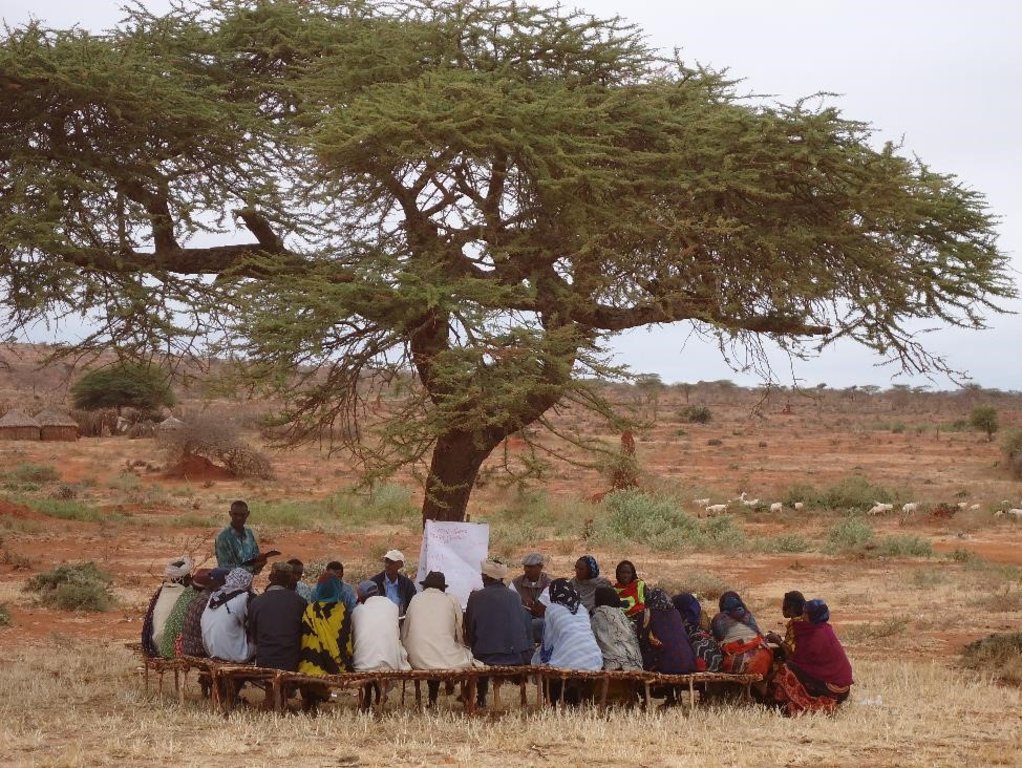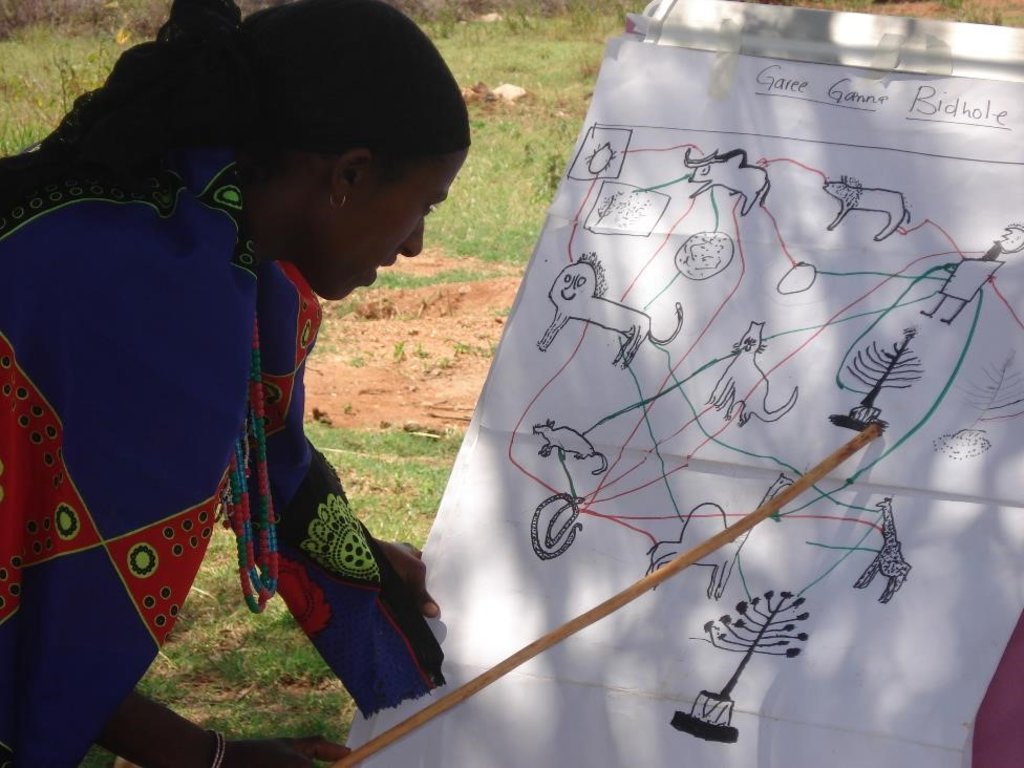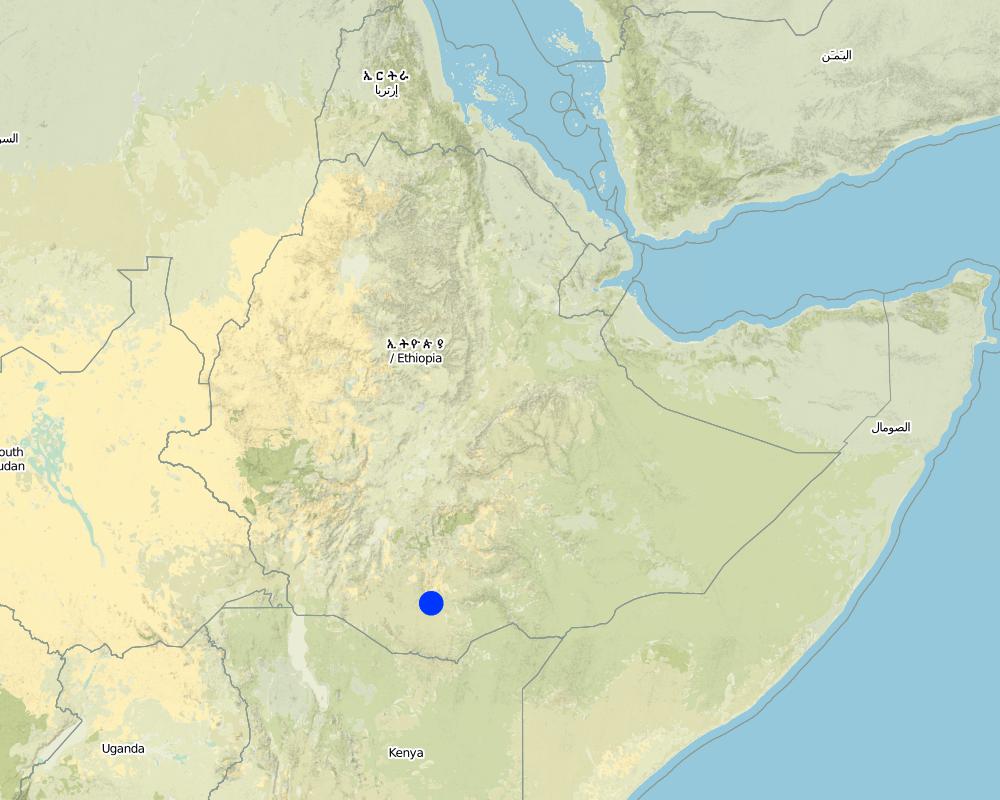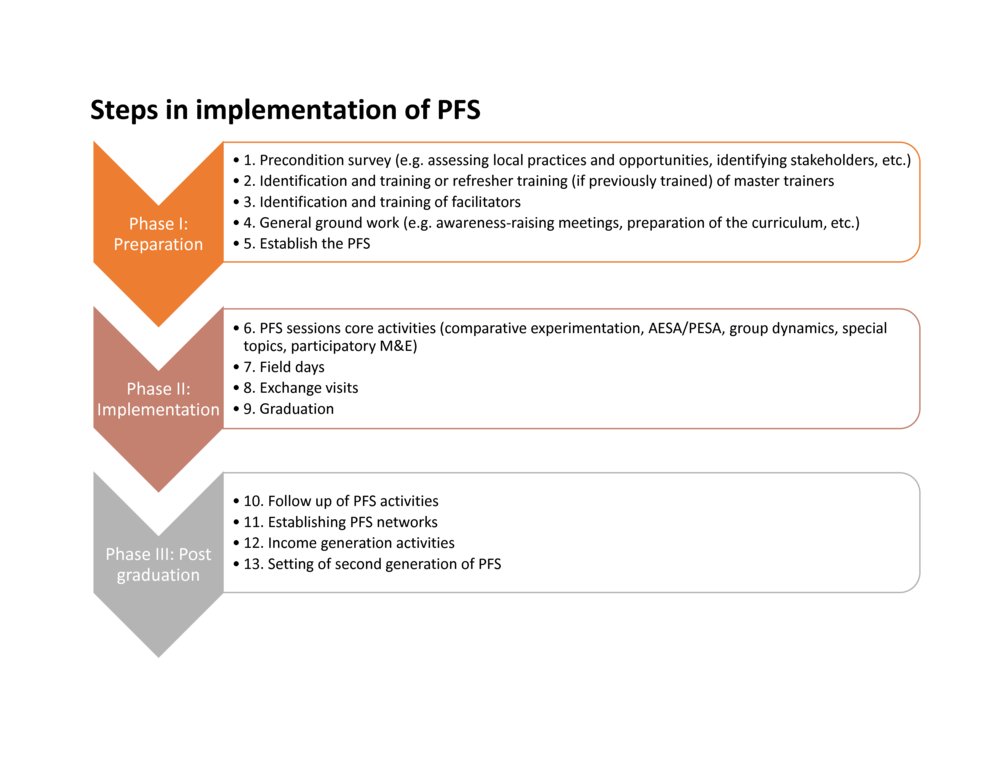Pastoralist field schools [เอธิโอเปีย]
- ผู้สร้างสรรค์:
- การอัพเดท:
- ผู้รวบรวม: Giacomo de' Besi
- ผู้เรียบเรียง: –
- ผู้ตรวจสอบ: Rima Mekdaschi Studer, Barbara *, Donia Mühlematter
approaches_3337 - เอธิโอเปีย
- บทสรุปทั้งหมดในรูปแบบของ PDF
- บทสรุปทั้งหมดในรูปแบบของ PDF เพื่อพิมพ์
- บทสรุปทั้งหมดในรูปหน้าเว็บ
- บทสรุปทั้งหมด (ไม่มีการจัดเรียง)
- Pastoralist field schools: 9 ตุลาคม 2018 (inactive)
- Pastoralist field schools: 24 เมษายน 2018 (inactive)
- Pastoralist field schools: 2 พฤศจิกายน 2021 (inactive)
- Pastoralist field schools: 4 กรกฎาคม 2018 (inactive)
- Pastoralist field schools: 15 มีนาคม 2018 (inactive)
- Pastoralist field schools: 21 สิงหาคม 2024 (public)
ดูส่วนย่อย
ขยายทั้งหมด ย่อทั้งหมด1. ข้อมูลทั่วไป
1.2 รายละเอียดที่ติดต่อได้ของผู้รวบรวมและองค์กรที่เกี่ยวข้องในการประเมินและการจัดเตรียมทำเอกสารของแนวทาง
วิทยากรหลัก
ผู้เชี่ยวชาญ SLM:
Duveskog Deborah
Deborah.Duveskog@fao.org
Food and Agriculture Organization of the United Nations (FAO)
United Nations Complex in Nairobi, UN Avenue, Gigiri, Block P Box 30470 Nairobi, Kenya
เคนยา
ผู้เชี่ยวชาญ SLM:
Nega Solomon
Solomon.Nega@fao.org
Food and Agriculture Organization of the United Nations (FAO)
CMC road Near ILRI, Kebele 12/13 Bole Sub City, Gurd Shola P.O. Box 5536 Addis Ababa, Ethiopia
เอธิโอเปีย
ชื่อของโครงการซึ่งอำนวยความสะดวกในการทำเอกสารหรือการประเมินแนวทาง (ถ้าเกี่ยวข้อง)
Improved food security, livelihoods and resilience of vulnerable pastoral communities in the Greater Horn of Africa through the pastoralist field school approachชื่อของโครงการซึ่งอำนวยความสะดวกในการทำเอกสารหรือการประเมินแนวทาง (ถ้าเกี่ยวข้อง)
FAO Kenya (FAO Kenya) - เคนยาชื่อของโครงการซึ่งอำนวยความสะดวกในการทำเอกสารหรือการประเมินแนวทาง (ถ้าเกี่ยวข้อง)
Food and Agriculture Organization of the United Nations (FAO) - อิตาลี1.3 เงื่อนไขที่เกี่ยวข้องกับการใช้ข้อมูลที่ได้บันทึกไว้ผ่านทาง WOCAT
วันที่เก็บรวบรวมข้อมูล (ภาคสนาม):
01/04/2014
ผู้รวบรวมและวิทยากรหลักยอมรับเงื่อนไขเกี่ยวกับการใช้ข้อมูลที่ถูกบันทึกผ่านทาง WOCAT:
ใช่
2. คำอธิบายของแนวทาง SLM
2.1 การอธิบายแบบสั้น ๆ ของแนวทาง
Pastoralist field schools improve livelihoods and resilience of pastoral communities through a process of hands-on experimental and participatory learning. They are "schools without walls" that introduce good agricultural and marketing practices while building on local knowledge. The PFS approach builds heavily on the basic principles of discovery based learning to address a wide range of issues affecting pastoral livelihoods.
2.2 การอธิบายอย่างละเอียดของแนวทาง
การอธิบายอย่างละเอียดของแนวทาง:
The Pastoral Field School (PFS) approach was the key development tool used in the FAO project entitled “Improved food security, livelihoods and resilience of vulnerable pastoral communities in the Greater Horn of Africa through the pastoralist field school approach”. The project was implemented between June 2011 and July 2015 and targeted agropastoralists in the West Pokot and Turkana areas of Kenya, the Karamoja area of Uganda and Borena and Guji Zones of Ethiopia. Indirect beneficiaries included Non-governmental organizations (NGO) and development actors involved in PFS actions across the region, largely through capacity building. The project was implemented through FAO regional and country offices in close collaboration with selected implementation partners in the countries, including communities, both local and international NGOs and governments.
The PFS approach is an adaptation of the Farmer Field School (FFS) approach. The FFS approach emerged in South East Asia in 1989 as a way to better engage farmers in a field-based enquiry for participatory identification and adoption/adaptation of solutions to local problems. The approach builds on the principles of adult and non-formal education, and experimental and emancipatory learning with a focus on learning processes and building analytical capacity as opposed to traditional extension approaches that focus on top-down dissemination of information to farmers. The PFS approach was first tested in 2006 in Kenya by FAO, Vétérinaires Sans Frontières Belgium and the International Livestock Research Institute (ILRI).
A PFS can be described as "school without walls" that introduces new pastoral techniques and practices (including SLM technologies) while building on indigenous knowledge, with community empowerment as a result. Through experiential and participatory learning techniques applied in a group setting (25-30 members), with regular meetings over a season/production cycle, , (agro-)pastoralists learn how to analyse their situation and make informed decisions about their livelihood practices and resource use strategies. When empowered to make informed decisions and adapt to changes in the environment, community members are better able to support disaster risk reduction and mitigation of climate change impacts. A facilitator (trained by an experienced field schoolmaster trainer and with a good understanding of pastoral issues) guides the learning process and ensures that the group activities are interlinked with a community managed disaster risk reduction plan. The technical topics covered can include animal production and health, pasture and range management, dryland farming, livestock fodder production, community-managed disaster risk reduction and alternative incomes. The informal nature of the approach further provides an excellent entry point to address social issues of gender inequities including gender-based violence, HIV, public health, population growth as well as conflict.
Mobility is an important factor to be considered in PFS as it bears on aspects such as the frequency and location of meetings. In some cases, PFS activities have to be interrupted during pastoral movements while in others the facilitator has to follow the field school group during migration. Agro-pastoralists may not always be available to participate in PFS activities as they may spend many hours or days with their livestock in search of water or fodder. Generally, PFS has a longer cycle than groups focusing on small-scale farming, and flexibility is needed when unforeseen events disrupt learning activities. Pastoralists and agro-pastoralists often live in conditions of high environmental uncertainty.
2.3 รูปภาพของแนวทาง
2.4 วีดีโอของแนวทาง
ความคิดเห็น อธิบายสั้นๆ:
Link: https://youtu.be/9rqZUEVF_kA
Schools Without Walls', (Agro)Pastoralist Field Schools in the Horn of Africa
See how members of Arbale Pastoralist Field School in Borana Zone, Southern Ethiopia are applying knowledge gained to implementing community managed disaster risk reduction action plans for the protection of vast areas of communal grazing lands.
วันที่:
28/05/2013
สถานที่:
Borana Zone, Southern Ethiopia
ชื่อของผู้ถ่ายวีดีโอ:
© FAO: http://www.fao.org
ความคิดเห็น อธิบายสั้นๆ:
Link: https://youtu.be/W0blRPPn3hg
Community Fodder Production in Mandera - Kenya
This video highlights how a pastoralist community in Mandera, Kenya applied knowledge gained in a pastoralist field school to improve their livelihood through fodder production.
วันที่:
28/05/2013
สถานที่:
Mandera, Kenya
ชื่อของผู้ถ่ายวีดีโอ:
© FAO: http://www.fao.org
2.5 ประเทศ ภูมิภาค หรือสถานที่ตั้งที่ได้นำแนวทางไปใช้
ประเทศ:
เอธิโอเปีย
ภูมิภาค/รัฐ/จังหวัด: :
Oromia region
ข้อมูลเฉพาะเพิ่มเติมของสถานที่ตั้ง:
Borena zone
ความคิดเห็น:
The PFS approach was applied in the Borena Zone as part of a FAO regional initiative that targeted agropastoralists in the West Pokot and Turkana areas of Kenya, the Karamoja area of Uganda and Borena and Guji Zones of Ethiopia.
Map
×2.6 วันที่เริ่มต้นและสิ้นสุดของแนวทาง
ระบุปีที่เริ่ม:
2011
ความคิดเห็น:
The approach was used within the framework of the FAO project entitled “Improved food security, livelihoods and resilience of vulnerable pastoral communities in the Greater Horn of Africa through the pastoral field school approach”. The project was implemented from 1 June 2011 to 31 July 2015. PFS learning enabled members to continue PFS activities and learning also after the end of the project.
2.7 ประเภทของแนวทาง
- เป็นนวัตกรรมท้องถิ่นล่าสุด/ นวัตกรรมใหม่
2.8 เป้าหมายหรือวัตถุประสงค์หลักของแนวทาง
To strengthen the capacity of pastoral communities and support improved natural resources management and disaster risk management to reduce food insecurity vulnerability.
2.9 เงื่อนไขที่เอื้ออำนวยหรือเป็นอุปสรรคต่อการนำเทคโนโลยีภายใต้แนวทางนี้ไปปฏิบัติใช้
บรรทัดฐานและค่านิยมทางสังคม วัฒนธรรม ศาสนา
- เอื้ออำนวย
- Pastoralists were able, committed and willing to work in teams and to invest their time in PFS learning activities.
- The community had a positive attitude to change and the local culture allowed for innovations.
การมีไว้ให้หรือการเข้าถึงแหล่งการเงินและบริการ
- เอื้ออำนวย
- PFS activities, learning and group action facilitated leveraging of financial resources and services. All PFS groups developed savings and credit schemes.
การจัดตั้งระดับองค์กร
- เอื้ออำนวย
- Efforts towards institutionalization enhanced PFS sustainability, improved quality, and strengthened impact and continuity.
การร่วมมือหรือการทำงานประสานกันของผู้ลงมือปฏิบัติ
- เป็นอุปสรรค
- Networking among implementing actors and key stakeholders could have been stronger.
นโยบาย
- เป็นอุปสรรค
- The PFS approach wasn't part of Government structures and procedures, so no enabling policies were in place
ความรู้เกี่ยวกับ SLM การเข้าถึงการสนับสนุนด้านเทคนิค
- เอื้ออำนวย
- PFS facilitators received technical support from subject matter specialists (e.g. animal scientists, veterinarians, agronomists). The specialists were invited to the PFS by the facilitators whenever technical inputs and assistance in designing appropriate experiments were needed.
- SLM technologies/ PFS practices were built on indigenous knowledge and local practices.
ตลาด (จัดซื้อปัจจัยนำเข้า ขายผลิตภัณฑ์) และราคา
- เอื้ออำนวย
- Promoting the use of locally available resources (e.g. agricultural and livestock inputs) was crucial to ensure PFS sustainability and the continuity of PFS activities.
3. การมีส่วนร่วมและบทบาทของผู้มีส่วนได้ส่วนเสียที่เกี่ยวข้อง
3.1 ผู้มีส่วนได้ส่วนเสียที่เกี่ยวข้องในแนวทางนี้และบทบาท
- ผู้ใช้ที่ดินระดับท้องถิ่นหรือชุมชนระดับท้องถิ่น
Pastoralists- PFS members and their communties.
Field school activities were carried out by the pastoralists themselves, ensuring a strong level of involvement of the beneficiaries throughout all stages of implementation.
- องค์กรพัฒนาเอกชน
Gayo Pastoral Development Initiative.
Implement Pastoralist Field School in the Borena zone.
- รัฐบาลระดับท้องถิ่น
- Miyo Pastoral Development Association (Government Institution).
- Moyalle Pastoral Development Association (Government Institution).
Implement Pastoralist Field School in the Borena zone.
- องค์การระหว่างประเทศ
Food and Agriculture Organization of the United Nations (FAO).
FAO was responsible for overseeing the overall implementation of the intervention, providing mentoring and technical support, create platform for harmonizing the field school approach and allocate required resources for implementation, provide guidance on linkages with related regional pastoral initiatives. The overall day-to-day management of the project was led by FAO's Resilience Team for Eastern Africa (RTEA), drawing on the technical expertise and experience of its headquarters in Nairobi, Kenya and its Subregional Office for Eastern Africa in Addis Ababa. Activities in Ethiopia were supported by the FAO Country Office. FAO field offices implemented the project in the targeted field locations, in collaboration with Non-Governmental Organizations (NGOs) and Government partners.
ถ้ามีผู้มีส่วนได้ส่วนเสียหลายคนที่เกี่ยวข้องให้ระบุหน่วยงานตัวแทน:
Food and Agriculture Organization of the United Nations (FAO)
3.2 การเกี่ยวข้องของผู้ใช้ที่ดินระดับท้องถิ่นหรือชุมชนระดับท้องถิ่นในช่วงต่างๆของแนวทาง
| ความเกี่ยวข้องของผู้ใช้ที่ดินระดับท้องถิ่นหรือชุมชนระดับท้องถิ่น | ระบุผู้ที่มีส่วนเกี่ยวข้องและอธิบายกิจกรรม | |
|---|---|---|
| การริเริ่มหรือการจูงใจ | ปฏิสัมพันธ์ | The PFS approach was presented to pastoral communities and their leaders as well as to local stakeholders (e.g. local government, development partners) to seek buy-in and collaboration. |
| การวางแผน | ปฏิสัมพันธ์ | Needs, priorities and opportunities for improvement were identified through a consultative process with the community before and throughout PFS implementation. The PFS members, not the facilitator, decided what was relevant to them and what they wanted the PFS to address. |
| การดำเนินการ | ปฏิสัมพันธ์ | As per PFS principles, the pastoral community was involved in all activities during project implementation and had a decision-making role. The dissemination of PFS practices/SLM technologies was encouraged among members and pastoral communities. Exchange visits (educational tours to other PFS), field days (getting non-PFS members involved in PFS activities), and share fairs were organized to promote trade and exchange of ideas. |
| การติดตามตรวจสอบหรือการประเมินผล | ปฏิสัมพันธ์ | The expansion of monitoring and evaluation tools and processes was part of the regular PFS implementation, with exercises and tools embedded in the PFS sessions to assess progress and allow members to take corrective action based on the results. |
| Impact assessment | ปฏิสัมพันธ์ | A major achievement of the intervention was the participatory impact assessment. The assessment was conducted using a mix of methods, including focus group discussions with PFS members, case stories, semi-structured interviews and scoring of perceived change before and after PFS membership. |
3.3 แผนผังแสดงขั้นตอนการทำงาน (ถ้ามี)
3.4 การตัดสินใจเลือกใช้เทคโนโลยี SLM
ระบุผู้ที่ทำการตัดสินใจเลือกเทคโนโลยีมากกว่าหนึ่งวิธีไปปฏิบัติใช้:
- ผู้ใช้ที่ดินเป็นผู้ตัดสินใจหลัก โดยการสนับสนุนจากผู้เชี่ยวชาญ SLM
การอธิบาย:
In PFS, learning is by doing, i.e. through practical activities and exercises. Throughout PFS implementation, members tested, validated, and adapted SLM technologies to their environments.
ระบุว่าการตัดสินใจตั้งอยู่บนพื้นฐานของ:
- ประสบการณ์และความคิดเห็นส่วนตัว (ไม่ได้ลงบันทึกไว้)
- hands-on testing and adaptation for local use
4. การสนับสนุนด้านเทคนิค การสร้างขีดความสามารถ และการจัดการด้านความรู้
4.1 การสร้างขีดความสามารถ / การอบรม
ได้มีการจัดอบรมให้แก่ผู้ใช้ที่ดินหรือผู้มีส่วนได้ส่วนเสียคนอื่น ๆ หรือไม่:
ใช่
ให้ระบุว่าใครเป็นผู้ได้รับการอบรม:
- ผู้ใช้ที่ดิน
- เจ้าหน้าที่ภาคสนาม / ที่ปรึกษา
ถ้าเกี่ยวข้อง ให้ระบุ เพศ อายุ สถานภาพ ชาติพันธุ์ เป็นต้น:
PFS are schools without walls where members actively learn through comparison of local practices with new ideas through Agro ecosystem analysis and comparative experiments, observation, critical analysis, discussion and making decisions. Technical training of PFS members forms part of the regular learning curriculum and is based on learner driven.
The intervention also involved the training of facilitators, mentors and master trainers.
Facilitators guide PFS activities and group discussions and help the group to reach a consensus on the actions that need to be taken. Before the onset of the PFS, facilitators organize preparatory activities, such as community consultations and PFS group formation and organization. The intervention trained new facilitators and carried out refresher training of existing facilitators. Training was supported by on-the-job training events and regular support to facilitators.
The main role of PFS master trainers is to train facilitators, mentoring FFS activities, planning, mentoring and monitoring and evaluation of FFS activities and promoting the field school approach. They received training through a three-month master trainer course. In direct connection with and during the master trainer training course, a number of PFS groups were established at community level for practical and hands-on learning among master trainers. Throughout the implementation period, FAO provided continuous mentoring to the master trainers to support their continuous professional development.
In the Borena zone, PFS activities were complemented by the strengthening of water points developed thorough an earlier SDC project.
รูปแบบการอบรม:
- กำลังดำเนินการ
- เกษตรกรกับเกษตรกร
- ใช้พื้นที่ทำการสาธิต
หัวข้อที่พูด:
The curriculum of PFS groups generally focused on: methodology and implementation, participatory learning and facilitation, group management and technical topics.
Some of the technical topics covered by the facilitator include gender, NRM, nutrition, forage production and health, conflict management, business skills development, village community banks (VICOBA), rangeland management, soil and water conservation and community-managed disaster risk reduction (CMDRR), and water scheme management.
4.2 การบริการให้คำแนะนำ
ผู้ใช้ที่ดินมีการเข้าถึงการรับบริการให้คำปรึกษาหรือไม่:
ใช่
ระบุว่ามีบริการให้คำปรึกษาหรือไม่:
- ไปเยี่ยมชมสถานที่
การอธิบาย/แสดงความคิดเห็น:
PFS are ‘schools without walls’ where capacity is developed from existing local knowledge. They are learning by doing and problem based, on the fields/rangelands of the community. PFS usually comprises a group of 25-30 pastoralists who meet regularly in a local field setting, under the guidance of a trained facilitator. They make observations on livestock production and rangeland ecosystem, focus on a topic of study, and compare the effects of alternative practices. As a result of the observations and analyses done directly on-site, participants make decisions on how to improve their practices. All PFS follow this systematic action learning process where the key steps are observation, reflection, group discussion, analysis, decision making and action planning.
4.3 การเสริมความแข็งแกร่งให้กับสถาบัน (การพัฒนาองค์กร)
สถาบันได้รับการจัดตั้งขึ้นมาหรือเสริมความแข็งแกร่งโดยแนวทางนี้หรือไม่:
- ใช่ ปานกลาง
ระบุระดับของสถาบันที่ได้รับการเสริมความแข็งแกร่งหรือจัดตั้งขึ้นมา:
- ท้องถิ่น
- ประเทศ
อธิบายถึงสถาบัน บทบาทและความรับผิดชอบ สมาชิก เป็นต้น:
The two government institutions (Miyo Pastoral Development Association and Moyalle Pastoral Development Association). and the NGO (Gayo Pastoral Development Initiative) that implemented the approach in the target area has been strengthened through capacity building on PFS.
ระบุประเภทของการให้ความช่วยเหลือสนับสนุน:
- การสร้างขีดความสามารถ / การอบรม
4.4 การติดตามตรวจสอบและประเมินผล
การติดตามตรวจสอบและประเมินผลเป็นส่วนหนึ่งของแนวทางหรือไม่:
ใช่
ความคิดเห็น:
Monitoring was conducted by the Swiss Agency for Development and Cooperation (SDC) office in Addis Ababa as well as through field missions and regular dialogue with the FAO Country Office in Ethiopia.
As per PFS priniciples, participatory M&E was also conducted during every PFS meeting. Both the PFS members and facilitator continuously assessed whether they were bringing any behavioural changes and actually achieving the learning objectives. Participatory M&E helped PFS practitioners actively observe and analyse situations and performances and understand what they were observing.
ถ้าตอบว่าใช่ แสดงว่าการจัดเตรียมเอกสารนี้มุ่งหวังที่จะเอาไปใช้สำหรับการติดตามตรวจสอบและประเมินผลใช่หรือไม่:
ไม่ใช่
4.5 การวิจัย
การวิจัยเป็นส่วนหนึ่งของแนวทางหรือไม่:
ใช่
ระบุหัวข้อเรื่อง:
- เศรษฐศาสตร์หรือการตลาด
- เทคโนโลยี
ให้ข้อมูลเพิ่มเติมและให้ระบุผู้ทำการวิจัย:
When needed, researchers and subject matter experts were invited to provide technical support to PFS groups. PFS developed/strengthened linkages between pastoral communities and researchers.
5. การสนับสนุนด้านการเงินและวัสดุอุปกรณ์
5.1 ระบุงบประมาณประจำปีสำหรับแนวทาง SLM นี้
ถ้าหากว่างบประมาณประจำปีไม่เป็นที่ทราบแน่นอน ให้ระบุช่วงลงไป:
- 2,000-10,000
แสดงความคิดเห็น (แหล่งของการระดมทุน ผู้บริจาคคนสำคัญ):
The budget range above refers to the costs incurred for implementing a single PFS within the project.
The Government of the Swiss Confederation, through the Swiss Agency for Development and Cooperation, contributed USD 2 154 100 for this FAO for this FAO project in Ethiopia, Kenya and Uganda.
5.2 การสนับสนุนด้านการเงิน / วัสดุอุปกรณ์ให้แก่ผู้ใช้ที่ดิน
ผู้ใช้ที่ดินได้รับการสนับสนุนด้านการเงิน / วัสดุอุปกรณ์ไปปฏิบัติใช้เทคโนโลยีหรือไม่:
ใช่
ถ้าใช่ ให้ระบุประเภทของการสนับสนุน เงื่อนไขและผู้จัดหามาให้:
Each PFS group received direct grants of USD 940 for their learning activities and to purchase inputs for PFS experimentation.
5.3 เงินสนับสนุนสำหรับปัจจัยนำเข้า (รวมถึงแรงงาน)
- ไม่มี
5.4 เครดิต
มีการจัดหาเครดิตมาให้ภายใต้แนวทาง SLM หรือไม่:
ไม่ใช่
5.5 แรงจูงใจหรือเครื่องมืออื่น ๆ
แรงจูงใจหรือเครื่องมืออื่น ๆ ได้ถูกนำไปใช้ส่งเสริมการใช้เทคโนโลยี SLM หรือไม่:
ไม่ใช่
6. การวิเคราะห์ผลกระทบและการสรุป
6.1 ผลกระทบของแนวทาง
ทำให้ผู้ใช้ที่ดินระดับท้องถิ่นมีอำนาจขึ้น ปรับปรุงการเข้าร่วมของผู้มีส่วนได้ส่วนเสียให้ดีขึ้นหรือไม่:
- ไม่ใช่
- ใช่ เล็กน้อย
- ใช่ ปานกลาง
- ใช่ อย่างมาก
PFS enabled and empowered pastoralists, their families and pastoral communities to understand and respond to local challenges. PFS members improved their understanding of the environment, obtained knowledge and learned additional skills which lead to improved capacity to manage available resources. PFS groups showed a greater level of cooperation and mutual help compared to the situation prior to the PFS project. PFS groups demonstrated enhanced capacity to seek self-generated solutions to problems identified by the group, generally developed through the experimentation and field analysis component of PFS, which in turn positively impacted on adoption rates of new practices and technologies.
ช่วยในการตัดสินใจโดยดูจากหลักฐาน ได้หรือไม่:
- ไม่ใช่
- ใช่ เล็กน้อย
- ใช่ ปานกลาง
- ใช่ อย่างมาก
PFS helped pastoralists to develop the skills required for informed decision-making in their environment.
ช่วยให้ผู้ใช้ที่ดินนำเอาเทคโนโลยี SLMไปใช้และบำรุงรักษาสภาพไว้ได้หรือไม่:
- ไม่ใช่
- ใช่ เล็กน้อย
- ใช่ ปานกลาง
- ใช่ อย่างมาก
As PFS members carried out PFS practices themselves and saw the direct results of the processes, they took ownership of the innovations and decisions on their livelihood activities. This was further enhanced by reduced production costs and the proceeds which the groups received from PFS practices that encouraged the members to continue with the efforts since they paid off.
ปรับปรุงความร่วมมือกันและการดำเนิน งานของ SLM ได้อย่างมีประสิทธิผลหรือไม่:
- ไม่ใช่
- ใช่ เล็กน้อย
- ใช่ ปานกลาง
- ใช่ อย่างมาก
Policy dialogue for institutionalizing PFS as an extension approach were successfully conducted with the federal Ministry of Agriculture and regional agriculture bureau and donors . The initial policy processes were funded by the European Union (EU) and the Swiss Agency for Development and Cooperation (SDC). They involved field implementation of field schools with policy deliberations at the local Government levels and cascading slowly to the National level. Later, an FAO project funded by SDC continued with the institutionalization process at the National level, Universities and research institutions. Policy makers are now willing to use the approach in the (agro)-pastoral areas of Ethiopia.
ระดมกำลังหรือปรับปรุงการเข้าถึงแหล่ง เงินทุนสำหรับการดำเนินการ SLM หรือไม่:
- ไม่ใช่
- ใช่ เล็กน้อย
- ใช่ ปานกลาง
- ใช่ อย่างมาก
PFS increased the abilty of pastoralists to leverage appropriate financial services through group action and improved skills and knowledge. The savings and credit schemes built into PFS interventions and resulting income generating activities contributed to an increase in financial capital. In general the money contributed benefited both men and women equally. However, in many cases women were the more frequent beneficiaries since they frequently borrowed to engage in petty businesses.
ปรับปรุงความรู้และความสามารถของผู้ใช้ที่ดินในการดำเนินการ SLM หรือไม่:
- ไม่ใช่
- ใช่ เล็กน้อย
- ใช่ ปานกลาง
- ใช่ อย่างมาก
PFS activities increased the awareness of communities on the sustainable management of natural resources and its relation to group productive and income generating activities. The PFS approach, in contrast to most conventional extension approaches, strengthens the capacity of local communities to analyse their livelihood systems, identify their main constraints and test possible solutions. By merging their own traditional knowledge with external information, stakeholders can eventually identify and adopt the most suitable practices and technologies to their livelihood system and needs to become more productive, profitable and responsive to changing conditions
ปรับปรุงความรู้และความสามารถของผู้มีส่วนได้ส่วนเสียคนอื่น ๆ ให้ดีขึ้นหรือไม่:
- ไม่ใช่
- ใช่ เล็กน้อย
- ใช่ ปานกลาง
- ใช่ อย่างมาก
The PFS approach improved knowledge and capacities of stakeholders at different levels starting from Federal to communities level.
ทำให้ผู้ใช้ที่ดินระดับท้องถิ่นมีอำนาจขึ้น ปรับปรุงการเข้าร่วมของผู้มีส่วนได้ส่วนเสียให้ดีขึ้นหรือไม่:
- ไม่ใช่
- ใช่ เล็กน้อย
- ใช่ ปานกลาง
- ใช่ อย่างมาก
The approach strengthens individuals’ knowledge and practices whilst reinforcing collaborative learning and bonding. By learning together over an extended period of time, collaboration between stakeholders/beneficiaries is strengthened.
ช่วยบรรเทาความขัดแย้งหรือไม่:
- ไม่ใช่
- ใช่ เล็กน้อย
- ใช่ ปานกลาง
- ใช่ อย่างมาก
Part of this approach includes incorporating conflict management more strongly. Through the PFS approach, stakeholders developed a greater understanding of how to plan for and mitigate disaster, and recognized how social factors such as conflict and gender inequality can exacerbate the effects of disasters.
ทำให้กลุ่มด้อยโอกาสมีอำนาจทางสังคมและเศรษฐกิจหรือไม่:
- ไม่ใช่
- ใช่ เล็กน้อย
- ใช่ ปานกลาง
- ใช่ อย่างมาก
Many groups had set rules for dealing with individual financial requirements, as well as individual emergencies, requiring group cohesion and solidarity support mechanisms, thus enhancing the community internal safety net for vulnerable members.
ปรับปรุงความทัดเทียมกันด้านเพศและให้อำนาจแก่ผู้หญิงและเด็กผู้หญิงหรือไม่:
- ไม่ใช่
- ใช่ เล็กน้อย
- ใช่ ปานกลาง
- ใช่ อย่างมาก
Women benefited from the initiative through empowerment and income generation through livelihood diversification. Women’s empowerment – i.e. enabling their inherent potential – was considered as one of the most prominent impacts of the intervention. Changes in gender relations as a result of the PFS approach was prominent. Women appreciated the fact that the PFS groups offered the opportunity for them to discuss issues and challenges with men in an organised and moderated manner. In general, and given the prevailing cultural norms, women had the opportunity to make their voices and arguments heard in all PFS groups.
ส่งเสริมให้เยาวชนหรือบุตรหลานของผู้ใช้ที่ดินให้เข้าร่วมใน SLM:
- ไม่ใช่
- ใช่ เล็กน้อย
- ใช่ ปานกลาง
- ใช่ อย่างมาก
Elema Kensa, a young PFS lady member said, “Women benefit from the enclosure in many ways. Before, women used to go very far in order bring food to our livestock. But, thanks to the PFS and our enclosure now we can harvest the grass nearby and give it to our livestock. Having this grass nearby reduces the burden of the women and this is a result of the education we got from PFS.”
ปรับปรุงประเด็นของการถือครองที่ดินหรือสิทธิในการใช้ ซึ่งขัดขวางการนำเทคโนโลยีไปใช้ให้ดีขึ้น:
- ไม่ใช่
- ใช่ เล็กน้อย
- ใช่ ปานกลาง
- ใช่ อย่างมาก
The community initiative led by the PFS group has taken to practicing the approach for their own livestock needs. The protected community grazing lands were fenced off, and livestock grazing was restricted and managed.
นำไปสู่ความมั่นคงด้านอาหารหรือปรับปรุงโภชนาการให้ดีขึ้น:
- ไม่ใช่
- ใช่ เล็กน้อย
- ใช่ ปานกลาง
- ใช่ อย่างมาก
Supported by PFS training and financed through the group saving schemes, most PFS groups initiated alternative income sources, resulting in diversified livelihood options and thereby increased food security and nutrition. The domestic food situation improved since the start of PFS activities in the target area as a result of increased agricultural production and increased purchasing power to buy additional food from alternative income sources.
ปรับปรุงการเข้าถึงตลาดหรือไม่:
- ไม่ใช่
- ใช่ เล็กน้อย
- ใช่ ปานกลาง
- ใช่ อย่างมาก
PFS activities increased access to input (e.g. agricultural equipment) and output markets and helped pastoralists to leverage appropriate markets and market information.
นำไปสู่การเข้าถึงเรื่องน้ำและสุขาภิบาลได้ดีขึ้นหรือไม่:
- ไม่ใช่
- ใช่ เล็กน้อย
- ใช่ ปานกลาง
- ใช่ อย่างมาก
Water for human and livestock use was improved through the improved water management practices applied by the group.
นำไปสู่การใช้ที่ดินอย่างยั่งยืนหรือแหล่งพลังงานหรือไม่:
- ไม่ใช่
- ใช่ เล็กน้อย
- ใช่ ปานกลาง
- ใช่ อย่างมาก
By closing off grazing areas, shrubs and trees were also protected. These species can be a source of fuelwood, but are often degraded.
นำไปสู่โอกาสในการจ้างงาน รายได้หรือไม่:
- ไม่ใช่
- ใช่ เล็กน้อย
- ใช่ ปานกลาง
- ใช่ อย่างมาก
The PFS members developed different alternative income generating activities which range from petty business especially for women, beekeeping, purchasing animal for fattening and re-sale, and purchasing and sale of animals without fattening.
6.2 แรงจูงใจหลักของผู้ใช้ที่ดินเพื่อที่จะนำ SLM ไปปฏิบัติใช้
- การผลิตที่เพิ่มขึ้น
- กำไร (ความสามารถ) อัตราส่วนค่าใช้จ่ายต่อผลประโยชน์ที่เพิ่มขึ้น
- การเสื่อมของที่ดินลดลง
- ความเสี่ยงของภัยพิบัติลดลง
- ความรู้และทักษะ SLM ที่เพิ่มพูนขึ้น
6.3 ความยั่งยืนของกิจกรรมของแนวทาง
ผู้ใช้ที่ดินสามารถทำให้สิ่งต่างๆ ที่ได้ปฏิบัติใช้โดยแนวทางนี้ยั่งยืนได้หรือไม่ (โดยไม่มีการสนับสนุนจากภายนอก):
- ใช่
ถ้าตอบว่าใช่ ให้อธิบายว่าอย่างไร :
The PFS promoted practices that build on local knowledge and practice and that require locally available production inputs.
6.4 จุดแข็งและข้อได้เปรียบของแนวทาง
| จุดแข็ง / ข้อได้เปรียบของแนวทางในทัศนคติของผู้ใช้ที่ดิน |
|---|
| This activity has improved the status of women through enabling them and offering them a greater spectrum of livelihood options. |
| PFS activities increased the awareness on sustainable management of the natural resources. This is an achievement as the PFS communities increase their income diversity and income generating capacity facilitated through natural resources. |
| The groups decided by discussion on emerging issues to be dealt with. This built considerable coherence within the group and ensured that those topics that were important were selected. |
| จุดแข็ง / ข้อได้เปรียบของแนวทางในทัศนคติของผู้รวบรวมหรือวิทยากรหลัก |
|---|
| The PFS approach in general contributed to generating increased, appropriate and self-defined livelihood options. Members have therefore the opportunity to improve their livelihood portfolio by spreading their activity base and thus prepare better for emerging challenges of greater variability than the community is used to. |
| The opportunity for members, especially women to meet, discuss at equal level with men and focus on problem solving. This is very much appreciated in a community setting where tribal institutions are respected. PFS groups show a greater level of cooperation and mutual help as compared to the situation prior the PFS intervention. |
| The approach does not rely on highly trained external advisors but on pastoralists' own discovery and reflection. It can function well even with facilitators of relatively low technical skills. This allows for scaling up of interventions more easily, since solutions are obtained jointly through an experimentation process. |
6.5 จุดอ่อน / ข้อเสียเปรียบของแนวทางและวิธีในการแก้ไข
| จุดอ่อน / ข้อเสียเปรียบในทัศนคติของผู้ใช้ที่ดิน | สามารถแก้ไขปัญหาได้อย่างไร |
|---|---|
| Attending PFS sessions requires time and effort, something participants not always have. | This is mostly a problem at the beginning. As soon as it becomes clear to participants what the added value of the approach is then they are perfectly fine with putting in the required effort and time. It is therefore important to make clear right from the beginning what the (expected) benefits to participants are. |
| Quality of implementation of PFS largely depends on the organizational, communication and methodological skills of facilitators as well as on their regular availability throughout the FFS cycle. In some instances, poor quality of facilitators has led to inadequate experimentation and ecosystem analysis. | Continuous support is required to improve the facilitation skills of facilitators. |
| Aligning PFS approach into the government extension system requires commitment of policy makers. | National platforms, policy makers visit of PFS activities and use of public media are some the mechanisms for creating awareness for institutionalizing PFS into the government extension sytem. |
| จุดอ่อน / ข้อเสียเปรียบในทัศนคติของผู้รวบรวมหรือวิทยากรหลัก | สามารถแก้ไขปัญหาได้อย่างไร |
|---|---|
| There is room for improving experimentation and linking it more strongly to an ecosystem analysis. | Better training of facilitators. |
| While taking up the issue of conflict and conflict management, the approach does not always fully cover the complete socioeconomic interconnections that the problem of conflicts in pastoral areas is linked to. | Make sure that a detailed socioeconomic analysis is undertaken before the interventions start. This will help in ensuring better coverage of all the complex relationships and interconnections. |
| Different institutions implement PFS differently. | Harmonization of the field school approach is critical among the field school practioners. |
7. การอ้างอิงและการเชื่อมต่อ
7.1 วิธีการหรือแหล่งข้อมูล
- การเก็บรวบรวมมาจากรายงานและเอกสารที่มีอยู่
7.2 การอ้างอิงถึงสิ่งตีพิมพ์
ชื่อเรื่อง ผู้เขียน ปี ISBN:
Impact Assessment of Pastoralist Field Schools in Ethiopia, Kenya and Uganda
ช่องทางในการสืบค้น และราคา:
http://www.fao.org/fileadmin/user_upload/drought/docs/PFS%20IA%20report%20final.pdf
ชื่อเรื่อง ผู้เขียน ปี ISBN:
Improved food security, livelihoods and resilience of vulnerable pastoral communities in the Greater Horn of Africa through the pastoral field school approach OSRO/RAF/103/SWI - Final report
7.3 เชื่อมโยงกับข้อมูลที่มีอยู่บนออนไลน์
ชื่อเรื่องหรือคำอธิบาย:
Pastoralist field schools- Training of facilitators manual
URL:
http://www.fao.org/3/a-bl492e.pdf
ชื่อเรื่องหรือคำอธิบาย:
Farmer field school guiadance document - Planning for quality programmes
URL:
http://www.fao.org/3/a-i5296e.pdf
ชื่อเรื่องหรือคำอธิบาย:
Global farmer field school platform
URL:
http://www.fao.org/farmer-field-schools/en/
ชื่อเรื่องหรือคำอธิบาย:
Pastoralist field schools: Discovery based learning in practice
URL:
http://www.celep.info/wp-content/uploads/2012/05/PFS-Reglap-learning-practice.pdf
ชื่อเรื่องหรือคำอธิบาย:
Farmer field schools for small-scale livestock producers- A guide for decision makers on improving livelihoods
URL:
http://www.fao.org/3/I8655EN/i8655en.pdf
ลิงก์และโมดูล
ขยายทั้งหมด ย่อทั้งหมดลิงก์
ไม่มีลิงก์
โมดูล
ไม่มีโมดูล


